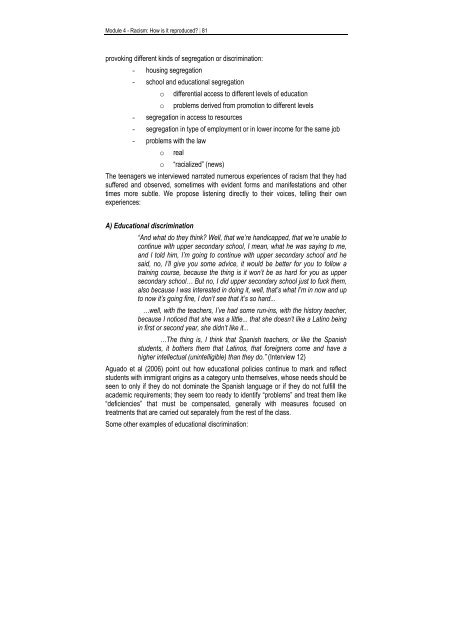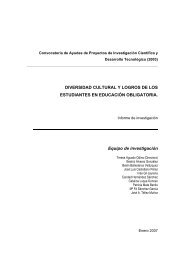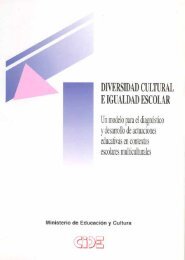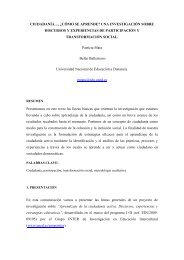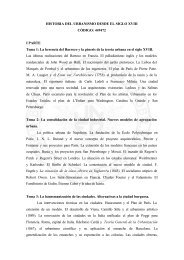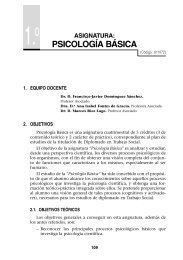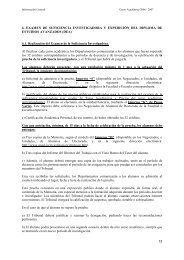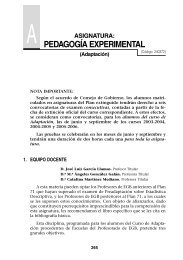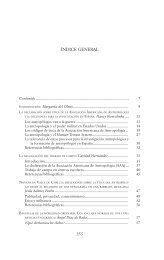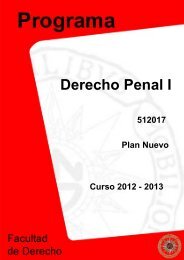Racism: What It Is and How to Deal with It - Uned
Racism: What It Is and How to Deal with It - Uned
Racism: What It Is and How to Deal with It - Uned
Create successful ePaper yourself
Turn your PDF publications into a flip-book with our unique Google optimized e-Paper software.
Module 4 - <strong>Racism</strong>: <strong>How</strong> is it reproduced? | 81<br />
provoking different kinds of segregation or discrimination:<br />
- housing segregation<br />
- school <strong>and</strong> educational segregation<br />
o differential access <strong>to</strong> different levels of education<br />
o problems derived from promotion <strong>to</strong> different levels<br />
- segregation in access <strong>to</strong> resources<br />
- segregation in type of employment or in lower income for the same job<br />
- problems <strong>with</strong> the law<br />
o real<br />
o “racialized” (news)<br />
The teenagers we interviewed narrated numerous experiences of racism that they had<br />
suffered <strong>and</strong> observed, sometimes <strong>with</strong> evident forms <strong>and</strong> manifestations <strong>and</strong> other<br />
times more subtle. We propose listening directly <strong>to</strong> their voices, telling their own<br />
experiences:<br />
A) Educational discrimination<br />
“And what do they think? Well, that we’re h<strong>and</strong>icapped, that we’re unable <strong>to</strong><br />
continue <strong>with</strong> upper secondary school, I mean, what he was saying <strong>to</strong> me,<br />
<strong>and</strong> I <strong>to</strong>ld him, I’m going <strong>to</strong> continue <strong>with</strong> upper secondary school <strong>and</strong> he<br />
said, no, I’ll give you some advice, it would be better for you <strong>to</strong> follow a<br />
training course, because the thing is it won’t be as hard for you as upper<br />
secondary school… But no, I did upper secondary school just <strong>to</strong> fuck them,<br />
also because I was interested in doing it, well, that’s what I’m in now <strong>and</strong> up<br />
<strong>to</strong> now it’s going fine, I don’t see that it’s so hard...<br />
…well, <strong>with</strong> the teachers, I’ve had some run-ins, <strong>with</strong> the his<strong>to</strong>ry teacher,<br />
because I noticed that she was a little... that she doesn’t like a Latino being<br />
in first or second year, she didn’t like it...<br />
…The thing is, I think that Spanish teachers, or like the Spanish<br />
students, it bothers them that Latinos, that foreigners come <strong>and</strong> have a<br />
higher intellectual (unintelligible) than they do.” (Interview 12)<br />
Aguado et al (2006) point out how educational policies continue <strong>to</strong> mark <strong>and</strong> reflect<br />
students <strong>with</strong> immigrant origins as a category un<strong>to</strong> themselves, whose needs should be<br />
seen <strong>to</strong> only if they do not dominate the Spanish language or if they do not fulfill the<br />
academic requirements; they seem <strong>to</strong>o ready <strong>to</strong> identify “problems” <strong>and</strong> treat them like<br />
“deficiencies” that must be compensated, generally <strong>with</strong> measures focused on<br />
treatments that are carried out separately from the rest of the class.<br />
Some other examples of educational discrimination:


